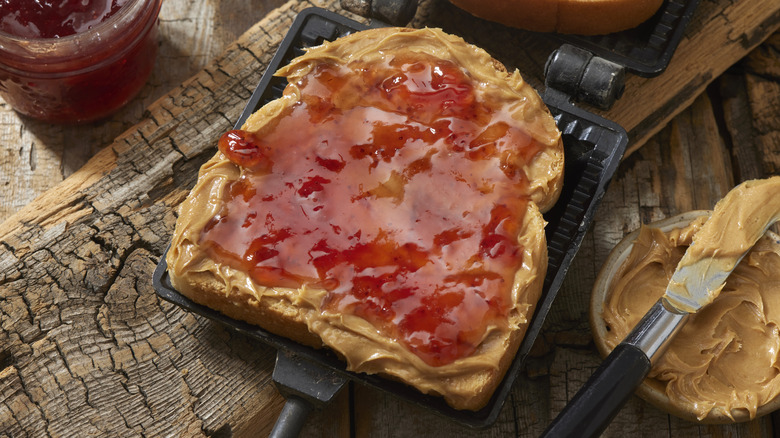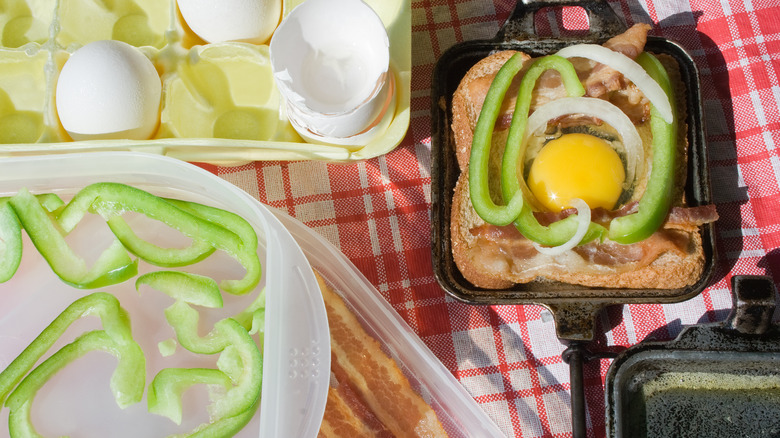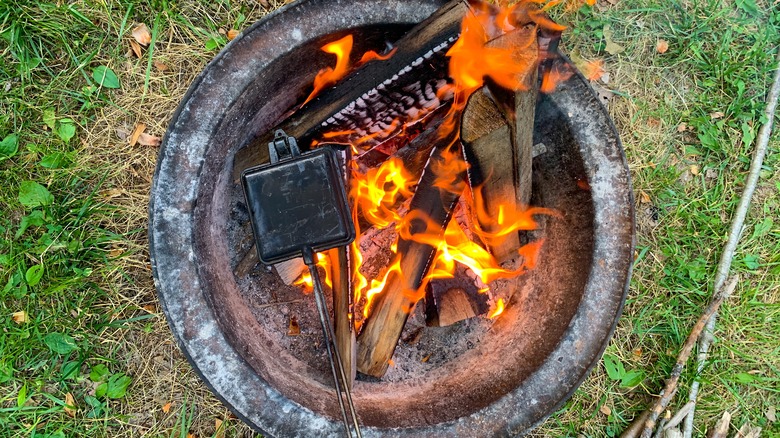The Material Of Your Pie Iron Makes A Difference For Campfire Cooking
Camping might be a time-honored summertime tradition, but let's be honest: No one likes camping for the rock-hard ground, suspiciously damp sleeping bags, and lack of bathroom facilities. We love camping because of the food cooked over a campfire or on a grill set up beneath a wide open night sky. Let's just say that campfire queso is the cheesy dip you need for your next camping trip, and you can thank us later. No matter how simple or sophisticated your menu is, mountain pies are essential treats for any camping trip. And for those, you'll need a pie iron.
A pie iron is a must-have camping accessory that's as versatile as you want it to be. Use it with bread and fillings for a grilled sandwich or a patty melt. Bring some pizza dough along for a campfire version of hot pockets, or use waffles for a sweet breakfast or dessert. Imagination is your only limit, but here's a question: Does it matter what kind of pie iron you purchase?
Absolutely. Research pie irons and you'll find there are two main choices. You'll probably find you need to decide if you want an aluminum pie iron or a cast iron one, and there are advantages and disadvantages to both. Let's talk about what you'll get with each one, and we'll help you decide which is best for you.
A cast iron pie iron is the last you'll ever buy
Just like the cast iron pans handed down through generations, a cast iron pie iron will last forever — as long as it's taken care of. It'll take a little care and effort and will need to be seasoned, but that happens naturally as you cook with it using oil.
And that's where one of the benefits of a cast iron pie iron comes in. When it's properly seasoned and maintained, it'll form a non-stick coating. That's exactly what you want when making pies, sandwiches, and pockets over a fire, and, yes, it'll make it easier to remove food from between the plates. (Some cast iron pie irons can be purchased pre-seasoned, which is a definite bonus.)
The other benefits of cast iron pans apply here, too. Opting for this type of pie iron won't just help ensure even heat distribution — which means everything inside will come out evenly grilled, baked, or melted — but it's incredibly durable. It's heavy, sure, but it's also tough enough that you'll be able to place it directly on the coals of a campfire and let it do its thing. For that reason, it's great for things that will take a little longer to cook: Think of things that include raw ingredients, like raw pizza dough or pancake batter.
Aluminum pie irons are more hands-on
If you like sitting around the fire holding your pie iron as it works its magic, an aluminum pie iron might be a better option. Since it's more lightweight, it's easier to hold and turn. But that convenience comes with a caveat: You need to handle it and keep an eye on how hot it's getting.
An aluminum pie iron is nowhere near as durable as a cast iron one, and if you leave it sitting in campfire coals, there's a good chance that it could melt, warp, and not only get destroyed but also destroy whatever you're trying to cook. Leaving it on the fire and walking away for only a short time can mean completely ruining an aluminum pie iron, and no one wants that. It's also more prone to surface damage, which can make it harder to cleanly remove what you're cooking. It's much more efficient for things that you're only melting — like a grilled cheese sandwich or gooey marshmallow smores.
That's not to say it doesn't have a place in your gear. If you're planning on hiking from one camping spot to another, it's a legitimate and lightweight addition to your gear. It will also cook just as evenly as a cast iron version, and if you purchase one with a non-stick coating, it'll work just fine ... but keep an eye on it and be careful when cleaning it.


